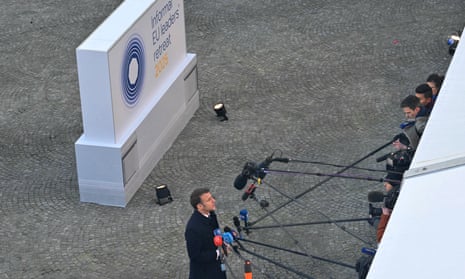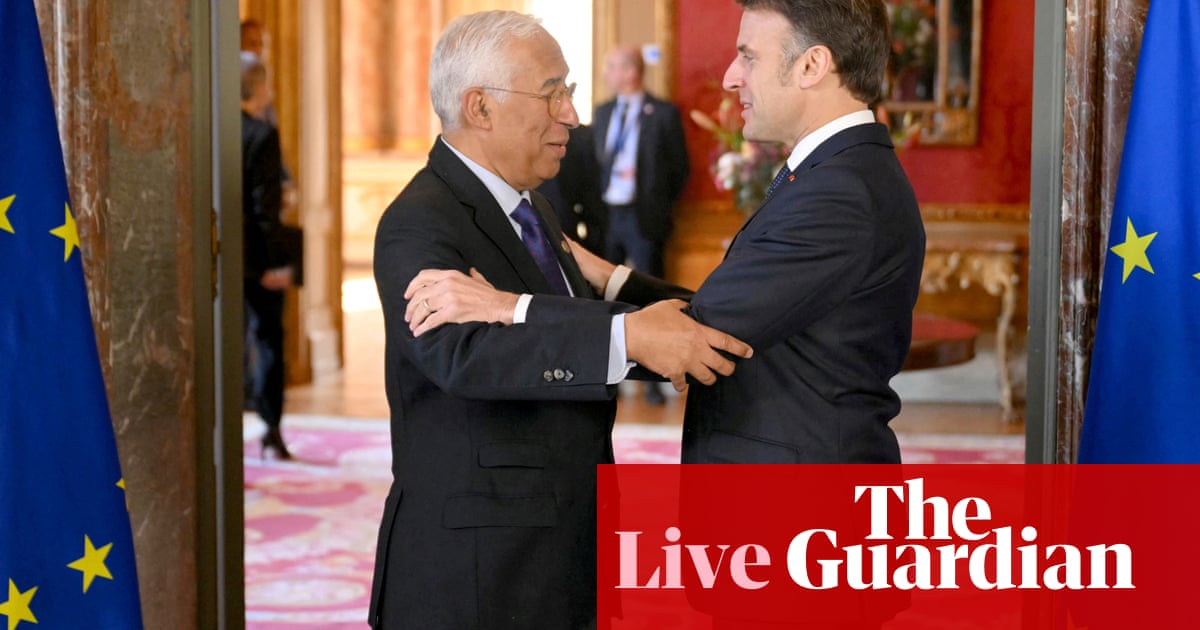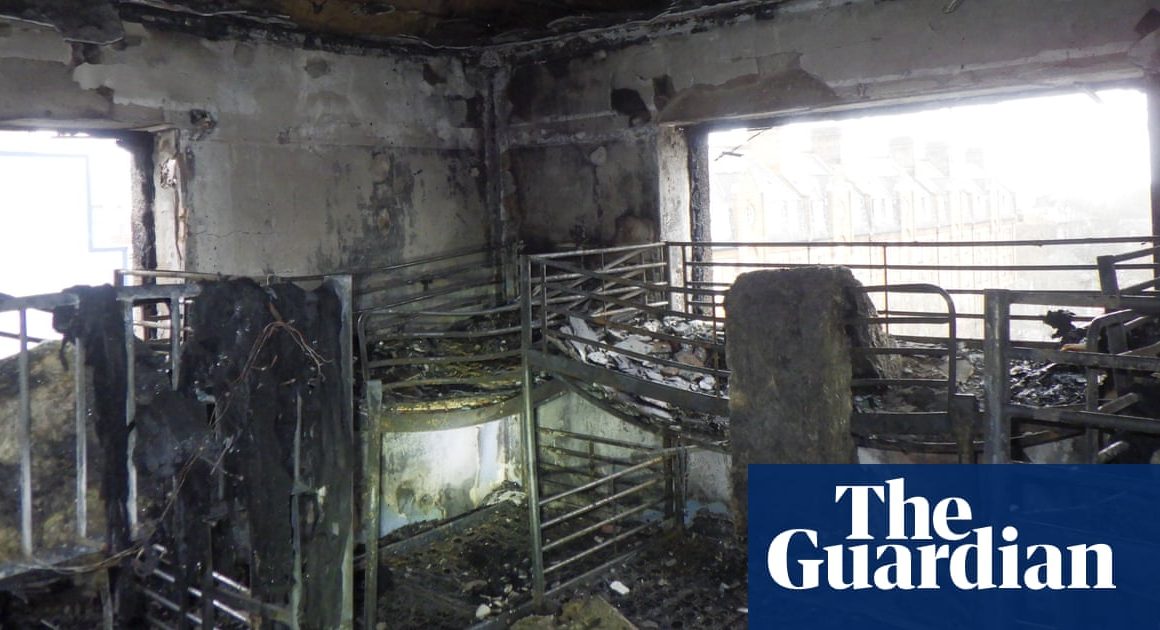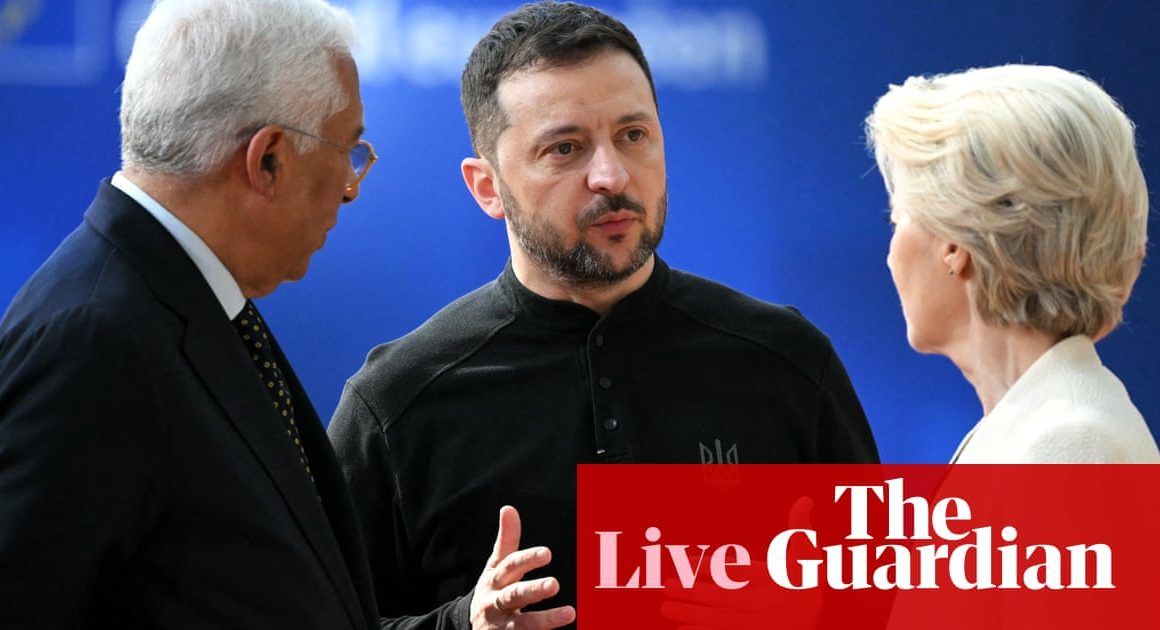First EU reactions to Trump’s tariff threats against the bloc – summary

Jakub Krupa
EU leaders have signalled that the bloc would be prepared to retaliate against the US if Donald Trump followed through on his threats to impose tariffs on European goods.
Speaking ahead of their informal meeting in Brussels, they repeatedly called for calm and stressed the value of EU-US cooperation, but indicated that they would not hide away from responding with tariffs if targeted first.
EU foreign policy chief Kaja Kallas said the bloc was “listening carefully” to Trump’s comments and “preparing on our side” to respond if needed.
However, she stressed that “there are no winners in trade wars” and pointed out that China would be the only beneficiary of that scenario.
French president Emmanuel Macron said that if Europe is “attacked in terms of trade … [it] will have to stand up for itself and therefore react.”
Polish prime minister Donald Tusk said the EU should do all it can to avoid “totally unnecessary and stupid tariff wars,” adding it would be a “cruel paradox” if the bloc was forced into a trade war with a long-standing ally.
Danish prime minister Mette Frederiksen, who is already embroiled in a separate crisis with Trump over the future of Greenland, said that while she would typically “never support fighting allies, if the US puts tough tariffs on Europe, we need a collective and robust response.”
Luxembourg’s prime minister Luc Frieden also said that “the answer to tariffs is to reply with [the] same action,” but insisted it should not overshadow today’s discussions on defence.
But some leaders struck a more conciliatory tone.
German chancellor Olaf Scholz said any tariffs would be “bad for the US and bad for Europe,” and stressed the need for cooperation to resolve this situation.
Finnish prime minister Petteri Orpo said: “We have to negotiate with Trump,” before adding: “I am not going to start a war, I want to start negotiations.”

Key events
-
First EU reactions to Trump’s tariff threats against the bloc – summary
-
Time to get closer with Britain, Poland’s Tusk says
-
If targeted, Europe will have to make itself respected, France’s Macron warns
-
Tariffs ‘bad for US and Europe,’ Germany’s Scholz warns, but hopes for cooperative way forward
-
We need to avoid ‘unnecessary and stupid’ tariffs, trade wars, Polish PM Tusk says
-
Danish PM calls for ‘collective and robust response’ if Trumps targets EU with tariffs
-
Greenland ‘not for sale,’ Danish prime minister says
-
‘We have to negotiate with Trump,’ Finnish prime minister says
-
US tariffs only benefit China, EU foreign policy chief Kallas says
-
Answer to tariffs is ‘to reply with same actions,’ Luxembourg’s Frieden says
-
Protests in Serbia
-
Latest on Ukraine
-
Denmark ‘not being a good ally’ over Greenland, US vice-president Vance says
-
New government in Belgium
-
EU cannot be ‘naive’ about Trump’s tariffs, Spanish economy minister says
-
Latest business reaction
-
Morning opening: Any Other Business
Time to get closer with Britain, Poland’s Tusk says
Poland’s Tusk also spoke about the British part of the summit, with UK prime minister Keir Starmer joining EU leaders for dinner, saying it was his initiative (Poland holds the EU’s rotating presidency until July) to invite him over to Brussels:
This is what he said (in Polish):
I am really keen that, regardless of Brexit and its consequences, to have the UK as close as possible to the EU when it comes to security issues, defence industry, and to find ways to eliminate or reduce barriers in trade between the UK and Europe.
Today is the moment to get as close as possible again.
If targeted, Europe will have to make itself respected, France’s Macron warns
French president Emmanuel Macron says bluntly that if Europe is targeted on its trade and commercial interests, it will have to make itself respected.
“If we are attacked in terms of trade, Europe – as a true power – will have to stand up for itself and therefore react,” he says.
His remarks are mostly focused on greater European independence and strategic autonomy in defence, saying that the Russian aggression of Ukraine and the new Trump administration “push Europeans to be more united.”
Tariffs ‘bad for US and Europe,’ Germany’s Scholz warns, but hopes for cooperative way forward
German chancellor Olaf Scholz warns that any tariffs would be “bad for the US and bad for Europe,” and says that while the EU could respond with its own policies, he wants to find a way forward based on cooperation between the two sides.
Somewhat unusually, he also returns to the issue of migration and refugee laws, extensively discussed in the Bundestag last week, directly attacking the CDU/CSU opposition in Germany for opposing EU laws in this area due to “party politics.”
Remember, we are three weeks out from the parliamentary election there.
We need to avoid ‘unnecessary and stupid’ tariffs, trade wars, Polish PM Tusk says
Poland’s prime minister Donald Tusk says the EU “has to do everything it can to avoid these totally unnecessary and stupid tariff wars or trade wars,” despite Trump’s comments.
He says it would be a “cruel paradox” if the EU was tested in such a way by a close ally while at the same time having to deal with “this direct Russian threat and Chinese expansion.”
He says the response to Trump could be the first serious test of the EU’s unity on this, though he notes it comes “in a very strange context,” given the tariff threat comes from an ally.
In the Polish part of his briefing, he also warns against “completely senseless conflict” over trade, and repeatedly stresses his support for Denmark over Greenland.
Danish PM calls for ‘collective and robust response’ if Trumps targets EU with tariffs
Danish prime minister Mette Frederiksen is also asked about Trump’s tariffs.
She says:
I will never support fighting allies, but if the US puts tough tariffs on Europe, we need a collective and robust response.
Greenland ‘not for sale,’ Danish prime minister says
Danish prime minister Mette Frederiksen is next up.
She rebukes latest comments on Greenland very directly, saying it is “not for sale.”
We have been very clear … that everybody has to respect the sovereignty of all the national states in the world, and that Greenland is today a part of the Kingdom of Denmark, and it’s not for sale. The leader of Greenland has been very clear they are not for sale.
She then says that she agrees with the US on the importance of Greenland for international security, but there are other ways of resolving this issue.
I totally agree with the Americans that … the Artic region is becoming more and more important … and it is possible to find a way to ensure a stronger footprint in Greenland. They are already there, and they can have more possibilities and we are willing to scale up, and Nato is the same.
If this is about securing our part of the world, we can find a way forward.
She also repeats her strong support for Ukraine as she says “I don’t think we should panic, but I think we are in a hurry” to strengthen European defence.
We need to change our mindsets, we need a sense of urgency, and we need to ensure that our industries and political cooperation work in a smoother way.”
‘We have to negotiate with Trump,’ Finnish prime minister says
Finnish prime minister Petteri Orpo warns that “Russia will be, and it is, a permanent threat to European countries, and the EU.”
“This is not an opinion; it’s a fact. That’s why every single country in the EU needs to be ready to use more on defence,” he says.
Asked about his response to Trump, he says:
We are prepared. We have to negotiate with Trump. This is one of the most important issues today. I am not going to start a war, I want to start negotiations.
US tariffs only benefit China, EU foreign policy chief Kallas says
EU foreign policy chief Kaja Kallas has just been addressing the media on her arrival in Brussels.
She spoke about the need for Europe to “do more, together” in defence and look at how new initiatives can be funded.
But she’s also inevitably asked about Trump’s tariffs, and this is what she says:
We were listening carefully to those words and of course we are preparing also on our side. What is clear, there are no winners in trade wars.
If US starts a trade war, the one laughing on the side is China. We are very interlinked. We need America, and America needs us as well.
Tariffs increase costs, they are not good for costs, and for customers.
Answer to tariffs is ‘to reply with same actions,’ Luxembourg’s Frieden says
Luxembourg’s prime minister Luc Frieden has just been asked to offer his thoughts on Trump’s tariffs:
I think that tariffs are always bad. Tariffs are bad for trade, they are bad for the US, bad for those who seek tariffs imposed.
The answer to tariffs is to reply with same actions.
But that is not a topic for today.
Protests in Serbia
Serbia’s powerful populist leader Aleksandar Vučić was facing his biggest challenge yet as student-led demonstrations intensified at the weekend in what was being called the Balkan country’s greatest ever protest movement.
Three months to the day after a concrete canopy collapsed at the entrance of Novi Sad’s railway station, tens of thousands of protesters converged on the northern city, blockading its three bridges in commemoration of the 15 people killed in the accident. The tragedy has been blamed squarely on government ineptitude and graft.
Saturday’s outpouring of dissent – the culmination of sit-ins and protests that began in November – have focused on what demonstrators have described as the government’s striking unwillingness to accept any accountability for the tragedy.
Reconstruction of the station was carried out in collaboration with a Chinese state consortium, as part of a large infrastructure project that critics contend paid little, if any, attention to safety regulations.
Latest on Ukraine
Adviser to Volodymyr Zelenskyy calls Keith Kellogg’s plan a failure after US envoy says he thinks both sides ‘will give a little bit’; British PM says Putin ‘rattled’ by Trump threats. What we know on day 1,076.
Our today’s host in Brussels, European Council president António Costa, has just arrived, but he is not in a mood to take any questions on Trump.
He says the point of the meeting is to have a “frank, open, and free discussion around … what are the priorities we need to develop… how we assure the necessary financing and how we strengthen our existing partnerships.”
He name-checks Nato secretary general Mark Rutte and UK prime minister Keir Starmer as special guests joining the EU leaders later during the day, but bats away questions saying he will talk to us again later.
His press conference after the summit is expected in late, late evening.
Denmark ‘not being a good ally’ over Greenland, US vice-president Vance says
US vice-president JD Vance spoke about Denmark and Greenland over the weekend, claiming that Denmark is “not doing its job, and it’s not being a good ally” by not countering the Chinese and Russian use of sea lanes in the area.
Trump’s No.2 asserted that the territory is “really important to our national security.”
He said:
How are we going to solve that problem, solve our own national security? If that means that we need to take more territorial interest in Greenland, that is what President Trump is going to do because he doesn’t care about what the Europeans scream at us, he cares about putting the interest of American citizens first.
He also repeated the line on how Greenlanders aren’t exactly happy under the Danish rule, although no word on their apparent lack of enthusiasm for that to be replaced by the US either.
New government in Belgium
After more than seven months of tortuous negotiations, we are going to get a new Belgian government today, after five parties struck a coalition deal on Friday, with Flemish conservative nationalist Bart De Wever to be the new prime minister.
The new PM channelled Julius Caesar by posting the Latin message “Alea iacta est! [the die is cast]” on social media alongside a picture of him shaking hands with Belgium’s King Philippe.
He has just been sworn in by the king this morning, and he is expected at the EU’s “informal retreat” shortly.
Straight to business.
EU cannot be ‘naive’ about Trump’s tariffs, Spanish economy minister says
The European Union must remain united to respond to US president Donald Trump’s threats to levy tariffs on its products, Spanish economy minister Carlos Cuerpo said on Monday, Reuters reports.
The EU was open to trade and in favour of a globalised world market, though the bloc should not be “naive” and protect its companies and should make sure they were in a position to compete in equal conditions with rivals from other countries, Cuerpo said in an interview with Spanish radio station RNE.
Latest business reaction
If you are interested in all the latest business reaction and stock markets movements after Trump’s tariffs, you can follow all of this on our business live blog here:
Spoiler alert: it’s not pretty.
German DAX, French CAC 40, Danish C25, Spanish IBEX, Italian FTSE MIB, British FTSE 100 all going in one direction.
Morning opening: Any Other Business

Jakub Krupa
EU leaders are gathering in Brussels this morning for an “informal retreat” to discuss European defence, including closer cooperation on procurement of defence capabilities.
If you’re thinking about a relaxing spa-like retreat, think again.
It is the first time EU leaders meet to discuss defence, but there are already some significant differences in how capitals seem to be thinking about these issues: French president Emmanuel Macron is understood to be pushing for the EU to primarily Buy European, while others worry that would further antagonise already fragile relations with the US.
Because, as has been a recurrent theme over the last two weeks, there is now no discussion on any topic that does not eventually lead to Donald Trump. Even if the question of dealing with his disruptive style of politics is not explicitly on the agenda and would probably fall under “any other business,” he is looming over almost every single thing the leaders will discuss today.
What is meant to be primarily a discussion on defence is therefore likely to at least touch upon questions on broader relationship with the US under Trump, after a frantic weekend during which he imposed “the most beautiful word in the dictionary”, tariffs, on Canada, China, and Mexico. They are due to kick in tomorrow.
Trump made it abundantly clear overnight that the EU is next, saying he would “definitely” go ahead with tariffs on the bloc “very soon” as it is “out of line.” “They take almost nothing, and we take everything,” he said in his unique style. “I wouldn’t say there’s a timeline, but it is going to be pretty soon,” he added.
The EU has previously signalled that it would retaliate and “respond firmly”. EU trade ministers are meeting in Warsaw on Tuesday, but it will be up to the leaders to decide the line on this and how much, if at all, they want to poke the bear further by turning only to European suppliers in defence.
In the meantime, the retreat on Monday also marks another occasion with British prime minister Keir Starmer attending an EU summit for the first time since Brexit five years ago. He will call upon all allies to “step up,” and urge EU leaders to “keep up the pressure” on Russian president Vladimir Putin to bring peace in the Ukraine war.
He will only join for a “working dinner” to discuss EU-UK defence, but his EU counterparts may also want to ask him on the sidelines to say a word or two about how he’s worked his charm on Trump.
The US president repeated on Sunday that while the UK was also “out of line,” “that one can be worked out,” and praised his relationship with Starmer, who is apparently “very nice.”
And as if all of that was not complicated or challenging enough, despite all the talk about potential thawing in relations with the former member state, the EU is reportedly considering stalling a new defence and security pact with the UK because of a dispute over fishing rights.
No one said it would be easy.
As this morning’s newsletter from the Polish daily newspaper Gazeta Wyborcza depressingly notes, “Tomorrow was meant to be better, but it isn’t.”
Elsewhere in Europe, we will be looking at the situation in France, where prime minister François Bayrou is expected to try to push his budget through without a vote using a little constitutional mechanism 49.3. Watch out for reactions and if there is an attempt to force a confidence vote on the back of it, which could even see him gone by the end of the week.
I will also keep an eye on the situation in Greece, where authorities are on high alert after hundreds of seismic tremors in Santorini, with fears that a bigger earthquake could be coming soon. Let’s hope not.
It’s Monday, 3 February 2025, and this is Europe live. It’s Jakub Krupa here.
Good morning.











